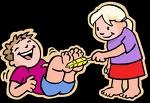The Tickle Point (continued)

This insight returned yesterday, when I attended a meeting with a bunch of Russell Ackoff Systems Thinking people. Since Systems Thinking has never hit the mainstream... most organizations still cling to reductionist dominion tactics when trying to resolve difficulties (or, as they say, 'solve problems'), ...the Systems Thinkers feel marginalized. Rather like feathers.
This was a meeting of the club of people who never join clubs, so many felt isolated, misunderstood, out of community.
Yet within an hour, we were gabbing away in small groups, finishing each other's sentences, in intimate, intense conversations. We'd been charged with creating a list of bullet points and a visual, but MY table blew off the facilitator's direction, in favor of something more memorable. Besides, no one at OUR table could draw, so I volunteered.I went to the front and explained that our dialogue had not yielded handy bullet points. You had to be there and experience it if you want to understand what we talked about. And there we were, mere feathers blown around by the wind, facing a fulcrum with the big hairy problems of the world on one side, a pin feather trying to counter-balance with critical mass to achieve some tipping point.
We decided that instead of trying to achieve critical mass to affect a tipping, it might be wiser to find that point along the fulcrum where the feather might achieve some tickle; the Tickle Point. BIG programs to combat BIG problems almost never succeed, because they are often BIG DUMB actions which raise no intelligent response from the offending system. But a tickle can wake up the system just enough so that it becomes just a little more aware of the stupid stuff it's doing, so more mindful adaptation, even evolution is possible.
(We also decided that if the tickle didn't work, we could always revert to the flipping point. That's always handy and easy to find.)
Here's the prior Tickle Point posting.


